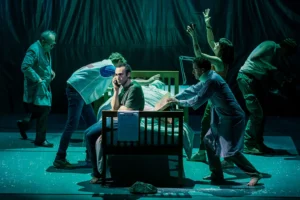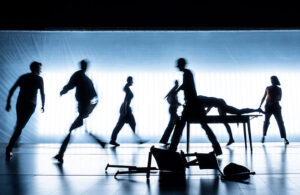More than a trip down memory lane
★★★★

Even now, as I reconstruct my memory of Complicité‘s Mnemonic in order to write this review, it has changed from my instant reaction after the show. Which is only right. This is a play about how memory works, the way it is constantly revised by new experiences, how it is vital for imagining the future.
But it’s more than a trip down Memory Lane: it’s a trip across Europe and a journey 5000 years into the past. It becomes a search for origins, and shows how our past, both personal and shared, informs where we are now and where we might go.
When I came out of the Olivier auditorium at the National Theatre, I was feeling I’d seen a familiar but nevertheless impressive use of mime to tell interesting but fairly simple stories. Now, I feel I saw something hugely important. Why the revision? Partly it’s because I’ve thought about it, but also it’s because the ongoing riots in Britain, which seem to be triggered by a desire to defend a vision of the past against change blamed on immigrants, have reminded me how Mnemonic is not an academic exercise but an examination through theatre of a contemporary issue that will affect all our futures.
I’m sure you know but, just in case, a mnemonic is any device or trick we use to jog our memory, from tying a knot in your handkerchief to using the first letters of words in a phrase to remind you of a sequence. For example: Richard Of York Gave Battle In Vain for the colours of the rainbow. This production of Mnemonic itself could be a mnemonic for those who saw the original and are taken back 25 years to what will now be a memory revised by the intervening years and this reimagined version.
In the intervening years, Complicité‘s techniques have come to seem less experimental, some are even commonplace. Few West End musicals are as naturalistic as they once were: they expose how the show is constructed, they use mime. But the book usually takes precedence. Very few productions give equal weight, as Complicité do, to every aspect: sound, light, set, props and the actors’ bodies in what you might call ‘total theatre’ to tell their stories, with text simply the starting point.
We start with a bare stage and a chair. In the style of a rambling comic, a man gives an introduction to the physiology of memory: how each new memory draws on and changes our existing memories (thanks to the hippocampus since you ask). We are invited to put on an eye mask and remember our past, then imagine being a child with our parents and their parents and their parents’ parents, going back through 5000 years at which point everyone on the planet is one of our ancestors which relates neatly, too neatly perhaps, to a recounting of the real life discovery of a human body frozen in the Alps for 5000 years, the so called Ice Man.
Parallel to this is the story of Omar whose girlfriend Alice has left him abruptly to search across Europe for her long-lost father. Cue many fragmentary adventures on a journey which she remembers and recounts, possibly unreliably. In a bravura performance by Eileen Walsh gives a bravura performance as Alice, increasingly frantic and riven with grief, ploughs her way through the diaspora of Jews, Greeks, Arabs and more who have spread across the world to escape danger or find a better life. It seems we are all migrants or the descendants of migrants, and may yet migrate ourselves.
The many possibilities of her ancestry are laid on thickly but show the futility of latching onto one past when you have an almost infinite number, all of which inform your present and, most importantly, your future. The determination to cover so much ground in Alice’s story makes it hard to get involved but it is told with the verve that Complicité are famous for. In particular, there is a moment when her money is stolen, and the memory of someone bumping into her is repeated and repeated, with variations, until finally we see exactly how she was robbed.
A stand out performance from Khalid Abdalla
The tale of the 5000 year old Ice Man was also, on the surface at least, an origins story rather that one obviously about memory. In the gradual development of the archeologists’ understanding of who he was and how he died, we do see an analogy of how memory works. In a wonderfully satirical moment, the scientists are shown sitting in a row at a conference, each imposing their own beliefs onto their interpretation of the scanty evidence that has been uncovered- so the Ice Man is said to have been a shaman, a trader, a hunter and so on. More than that- and it’s rare that Complicité works only on one level- there is the implication that as our common ancestor, he is all the things we are.
At a time when politicians, populists and owners of social media use fear and division to their own ends, it is a good moment to speak up for our common humanity and the way all history flows into each of us and out again.

But it would be pure didactics without Complicité‘s outstanding way of creating theatre to convey the stories. A bed, a table, a couple of chairs are all that was needed most of the time in Michael Levine‘s spare set. Dialogue is echoed, movements repeated, actors flow around the stage like migrants might flow around the world. A seemingly simple chair transforms into a puppet that takes the last steps of the Ice Man before he died.
At the climax of the evening, the various characters follow one another faster and faster round the stage, as if in a vortex, in which their individuality becomes blurred.
You can imagine this is no walk in the park for the actors. Nearly all are required to take on multiple roles, but also to mime and move with precise choreography. Tim McMullan is tremendous as a senior archeologist full of wonder, humour and enthusiasm. Richard Katz, Laurence Laufenberg, Kostas Philippoglou and Sarah Slimani are all superb.
But the stand out performance comes from Khalid Abdalla, whom you might recognise as Dodi Al Fayed in the TV series The Crown. He plays both Omar, falling apart as he misses Alice, and the Ice Man, picked apart by archeologists. In both roles, he spends much of his time naked, because that’s how the corpse was discovered, and because that’s how Alice likes to see Omar. In both cases, nakedness seems to become a symbol of humanity stripped of all defences and pretences. Without clothing, they are not part of a tribe or a profession or any group, they are Everyone, at either end of 5000 years. Just as the Ice Man is at the mercy of scientists, journalists and nationalists, so Omar’s future is subject to Alice’s wishes.
All of which may seem a long way from memory, or indeed a mnemonic, but what Complicite‘s artistic director Simon McBurney has pulled together, in collaboration with the company, is a piece of pure theatre- in the sense that it would not work as film or any other art form- that evokes how memory of the past is reformed in the present and gives us the possibility of moving forward together. What better way than through the shared experience of theatre to feel our common humanity? My memory says that, despite its weak stories, I witnessed something very special.
Mnemonic can be seen at the National Theatre until 10 August 2024.
Paul paid for his ticket.